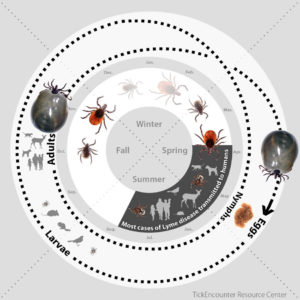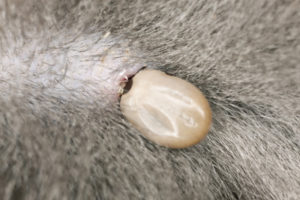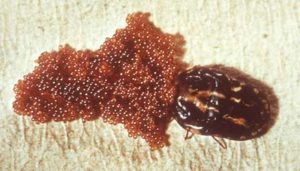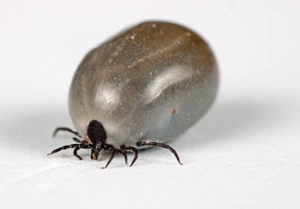With the prevalence of ticks and tick-borne illnesses in our area, you might be familiar with engorged ticks.

But do you know what engorged ticks are up to? Why do they seek blood in the first place? Ticks must feed on blood during each stage of their life in order to live to the next stage. Their goal in life is to live to adulthood and procreate. As adults, ticks will seek their final blood meal in order to mate. What happens when ticks become engorged? Do ticks fall off when they are engorged? What happens after a tick mates?
Do ticks die when they become engorged?

When an adult tick feeds on human or animal blood, they are doing so prior to mating. Male ticks will feed, but do not usually become engorged like females. Once a female tick becomes engorged with blood, she will detach from her host to seek a mate. Once she mates, she can lay thousands of tick eggs. After laying her clutch of eggs, she will die. Once an adult male tick mates, he too, will die. So, while a tick does not immediately die after becoming engorged on blood, they will die after taking a blood meal and mating.

Where will the tick go to mate? Ideally, when a tick falls off, they would need to be outdoors to mate. It is reported that the brown dog tick can live and mate indoors, where they might lay their eggs in carpet, or somewhere protected inside a home. I think the likelihood of this happening is very small. Tick prevention for your pet is one great way to prevent this.
How long does it take a tick to become engorged?

A tick will need to remain attached to its host at least 36 to 48 hours to take a complete blood meal. This goes for nymph and adults, alike. More often, nymph ticks are responsible for the spread of disease. It will take at least 24 hours of attachment before Lyme disease is spread to the host. Nymph ticks are so small, they are often not found until they begin to get engorged with blood. This is why they transmit most tick-borne illnesses.
The best way to prevent encountering ticks is with full-scale tick control.
 Professional Central Mass tick control is a top priority for the health and safety of your family. Full-scale efforts require barrier tick protection, applied to your property from springtime through fall. In the late fall and winter, those efforts continue with innovative tick tubes. This method of tick control is the best form of tick-borne illness prevention, as it literally stops the tick life cycle in its tracks. With year-long protection, you will notice a greatly decreased number of ticks that emerge in the springtime.
Professional Central Mass tick control is a top priority for the health and safety of your family. Full-scale efforts require barrier tick protection, applied to your property from springtime through fall. In the late fall and winter, those efforts continue with innovative tick tubes. This method of tick control is the best form of tick-borne illness prevention, as it literally stops the tick life cycle in its tracks. With year-long protection, you will notice a greatly decreased number of ticks that emerge in the springtime.

One thought on “Engorged Ticks: What happens when a tick becomes engorged?”
Comments are closed.